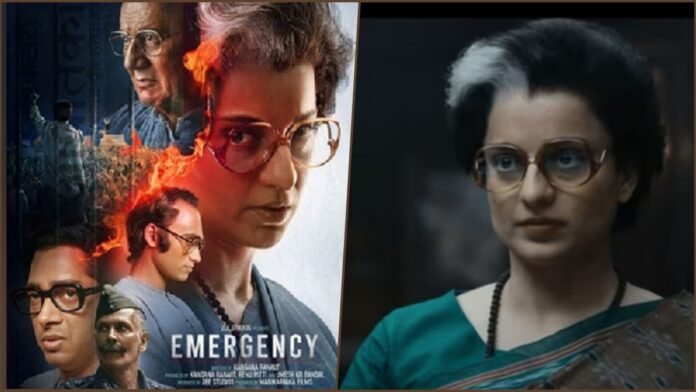
Key Points:
- Polarizing Plot: The much-awaited film “Emergency” disappointed both BJP supporters and Congress loyalists.
- BJP Expectations Dashed: Viewers hoped for a strong critique of the Emergency era, but the film portrayed Indira Gandhi as a bold, sympathetic leader.
- Congress Criticism: Congress objected to the depiction of Indira Gandhi’s childhood and political narrative.
- Political Neutrality Misfires: The film attempted a balanced approach but left both political factions unsatisfied.
- Kangana’s Gamble: The actress took a risk by addressing a sensitive historical topic but faced criticism from audiences and political circles alike.
Mumbai: Bollywood actress and Bharatiya Janata Party (BJP) MP Kangana Ranaut’s ambitious film “Emergency” has ignited a storm of controversy since its release. Set against the backdrop of the 1975–77 Emergency, the film aimed to explore one of India’s most turbulent political chapters. However, its narrative has left both BJP and Congress supporters disgruntled, making it a rare case of bipartisan dissatisfaction.
5 Reasons Why “Emergency” Flopped
- Storyline Diverges from Expectations
- The film’s title led audiences to expect an intense critique of the Emergency era, widely regarded as a dark chapter in India’s democracy. BJP supporters anticipated a narrative that would underscore the excesses of the period, such as censorship, arrests, and the violation of civil rights.
- Instead, the Emergency is used merely as a backdrop. The film focuses on former Prime Minister Indira Gandhi’s personality and leadership, portraying her as a decisive leader who faced personal and political challenges with courage.
- Indira Gandhi as a Central Heroine
- Kangana’s film highlights Indira Gandhi’s resilience. A pivotal scene shows Gandhi assuring the people of Assam during political uncertainty, emphasizing her commitment to the nation.
- The film depicts her seeking advice from BJP stalwart Atal Bihari Vajpayee before the Bangladesh War, attempting to show her as a consensus-builder rather than a dictator.
- It also blames Sanjay Gandhi for the excesses of the Emergency, painting Indira as a reluctant enforcer who eventually ends the Emergency out of conscience.
- Disappointment Among BJP Supporters
- BJP supporters were disheartened by the film’s portrayal of Indira Gandhi as a bold, visionary leader rather than focusing on the oppressive policies of the Emergency.
- Many expected a critique aligned with the BJP’s long-standing narrative of the Emergency as the “darkest chapter of Indian democracy.” The film’s unexpected tone prompted one viewer to remark, “We expected a critique of the Emergency but got a tribute instead.”
- Congress’s Mixed Reactions
- Congress leaders found certain depictions objectionable, including Indira Gandhi’s statement, “Indira is India and India is Indira,” which they claim distorts the original context.
- While Congress resented the film’s portrayal of Gandhi’s early life and political decisions, they were equally hesitant to praise a project helmed by a BJP MP.
- Kangana’s Risky Gamble
- By choosing a politically charged topic, Kangana Ranaut took a significant risk. The film’s attempt at neutrality—neither condemning nor glorifying either political faction—left audiences and political groups dissatisfied.
- This approach alienated potential viewers on both sides of the political spectrum, contributing to its lukewarm reception.
Audience and Political Circles Divided
For BJP Supporters:
- The film felt like a missed opportunity to highlight the Emergency’s atrocities, such as censorship and forced sterilizations, which the BJP has consistently criticized.
For Congress Loyalists:
- They viewed the narrative as flawed and incomplete, particularly in its attempt to humanize Gandhi’s decisions without fully justifying them.
Kangana’s Challenge Moving Forward
Despite the backlash, Kangana’s attempt to bring history to the silver screen deserves recognition for sparking a renewed interest in India’s political past. However, the film’s failure to resonate with audiences serves as a lesson that political narratives demand nuanced storytelling to satisfy diverse perspectives.
“Emergency” may not have succeeded in delivering the impactful revelations audiences expected, but it has certainly ignited conversations about a pivotal era in India’s history.





















































